课时5 七年级Unit 5 2025年中考英语(仁爱版)一轮复习考点探究学案(含答案)
文档属性
| 名称 | 课时5 七年级Unit 5 2025年中考英语(仁爱版)一轮复习考点探究学案(含答案) |
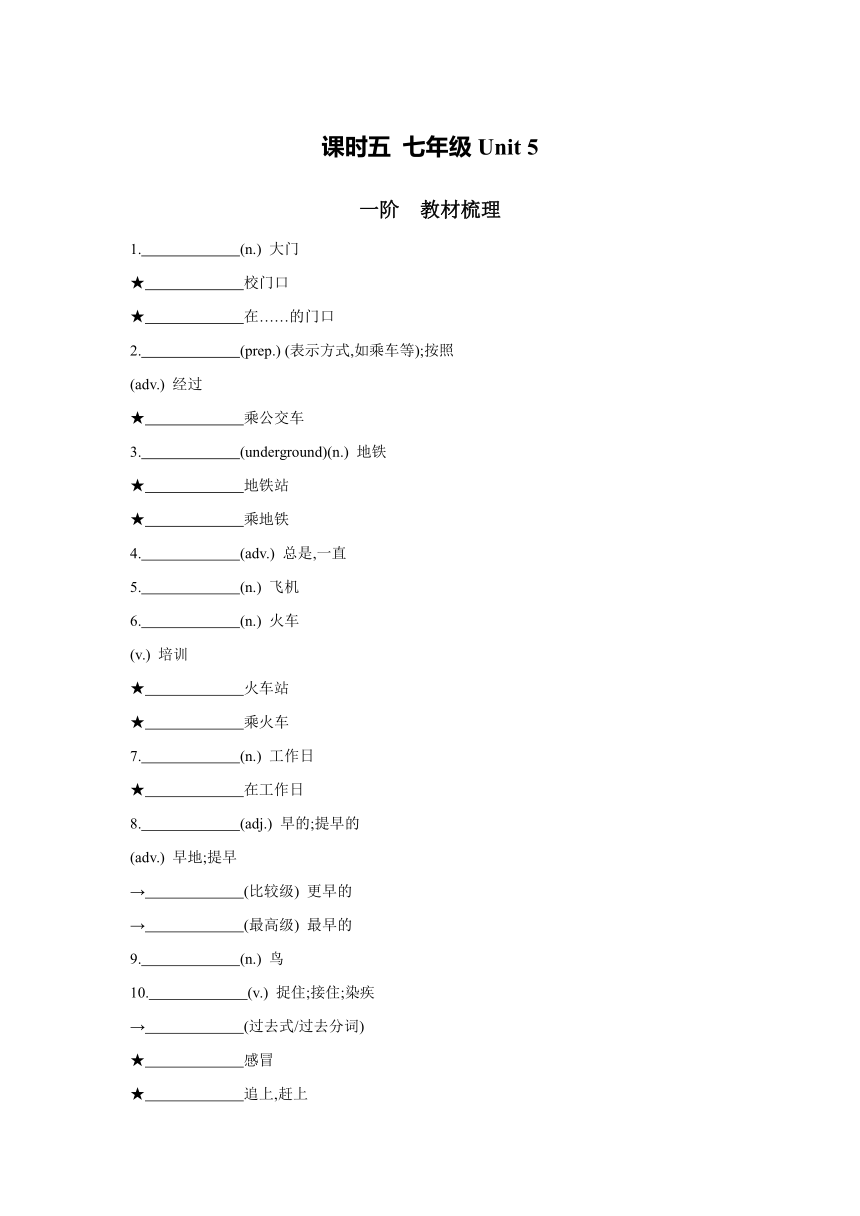
|
|
| 格式 | docx | ||
| 文件大小 | 189.6KB | ||
| 资源类型 | 教案 | ||
| 版本资源 | 仁爱科普版 | ||
| 科目 | 英语 | ||
| 更新时间 | 2024-10-31 00:00:00 | ||
图片预览

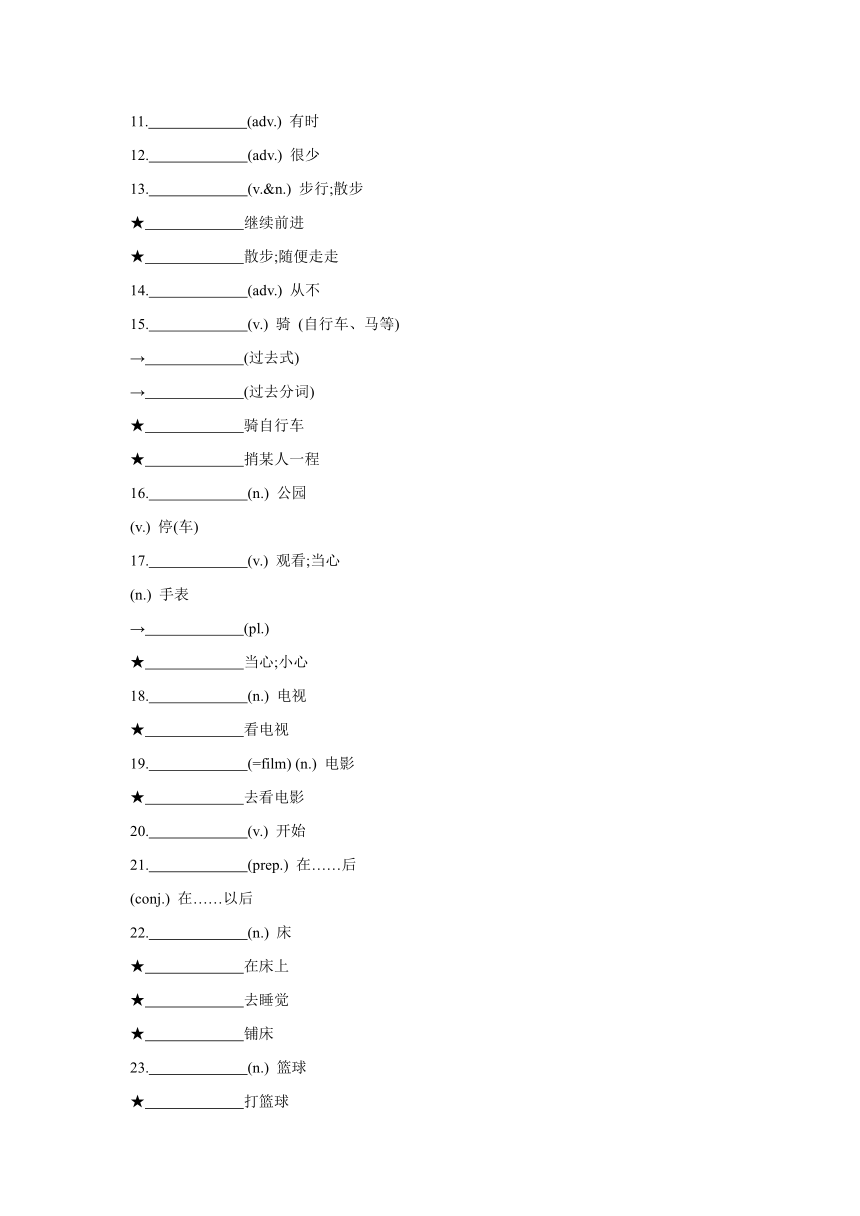
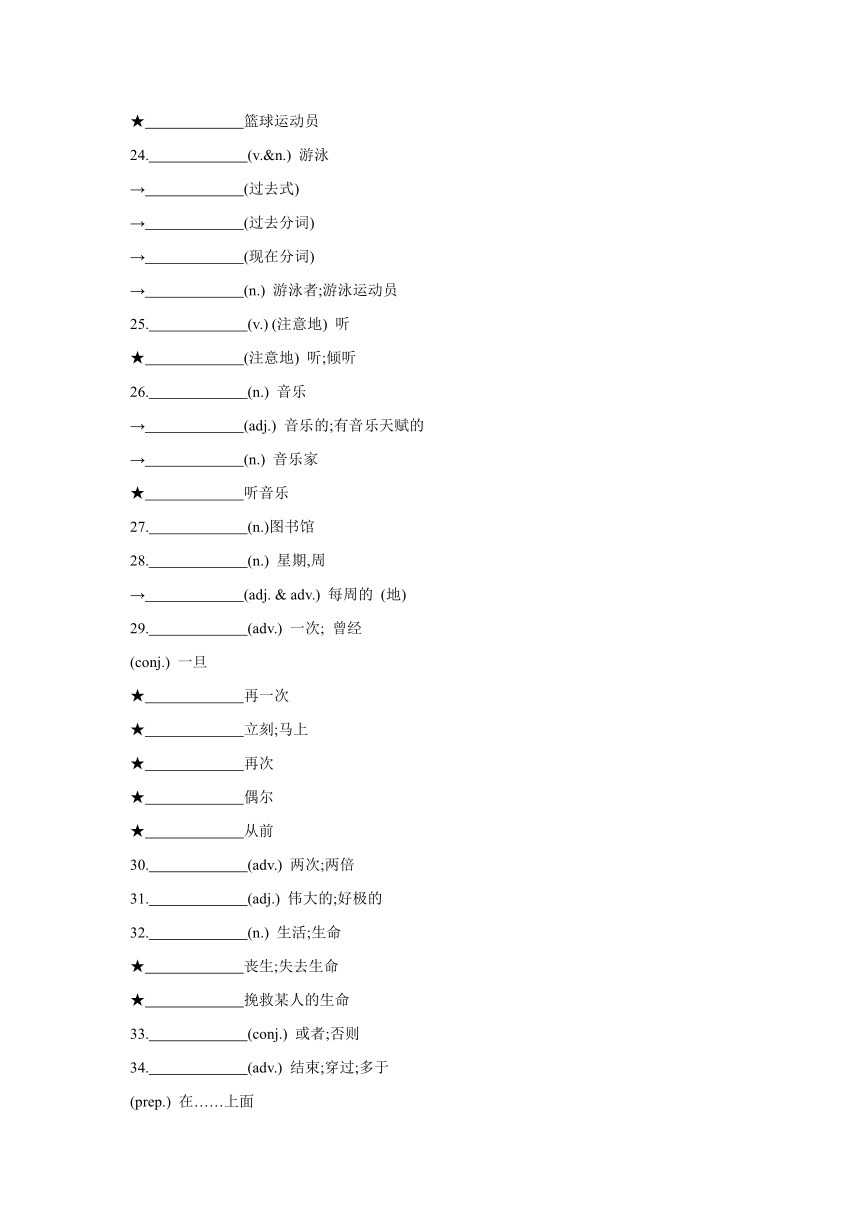
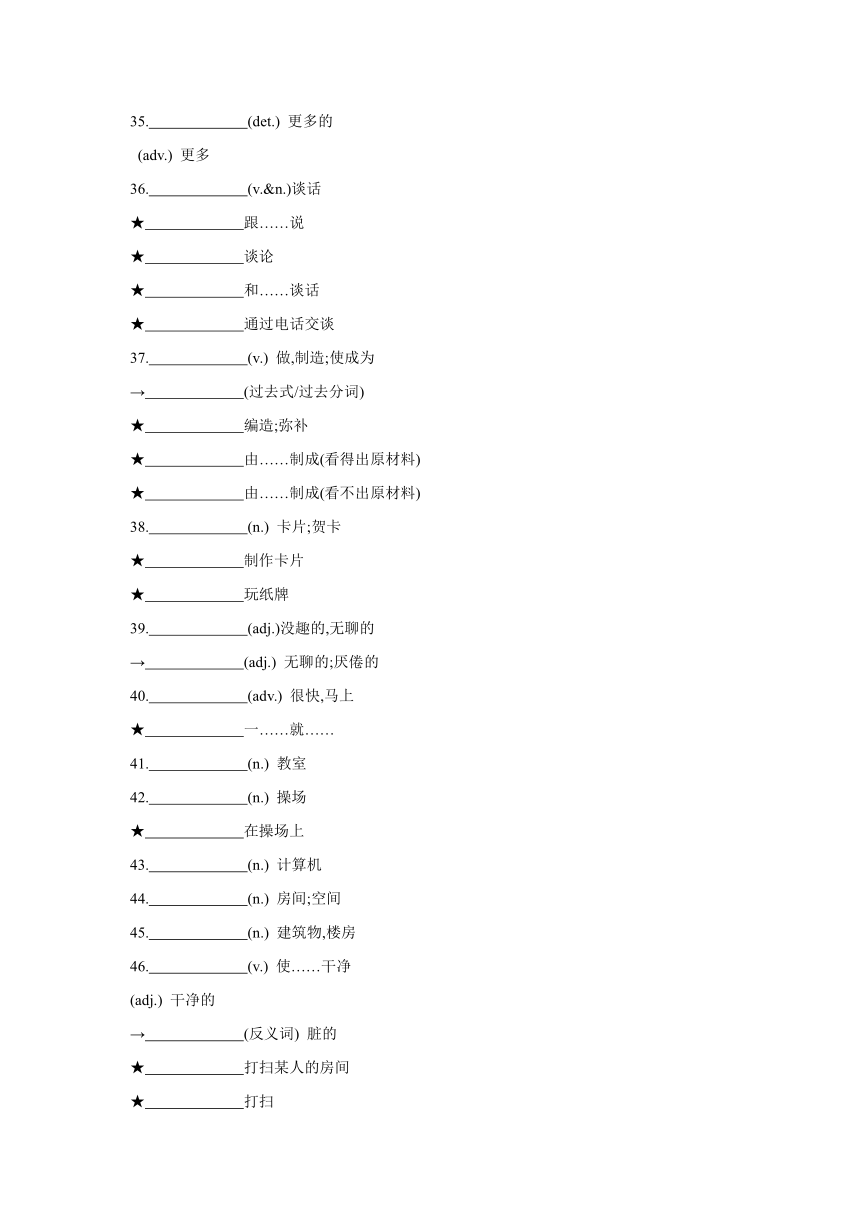
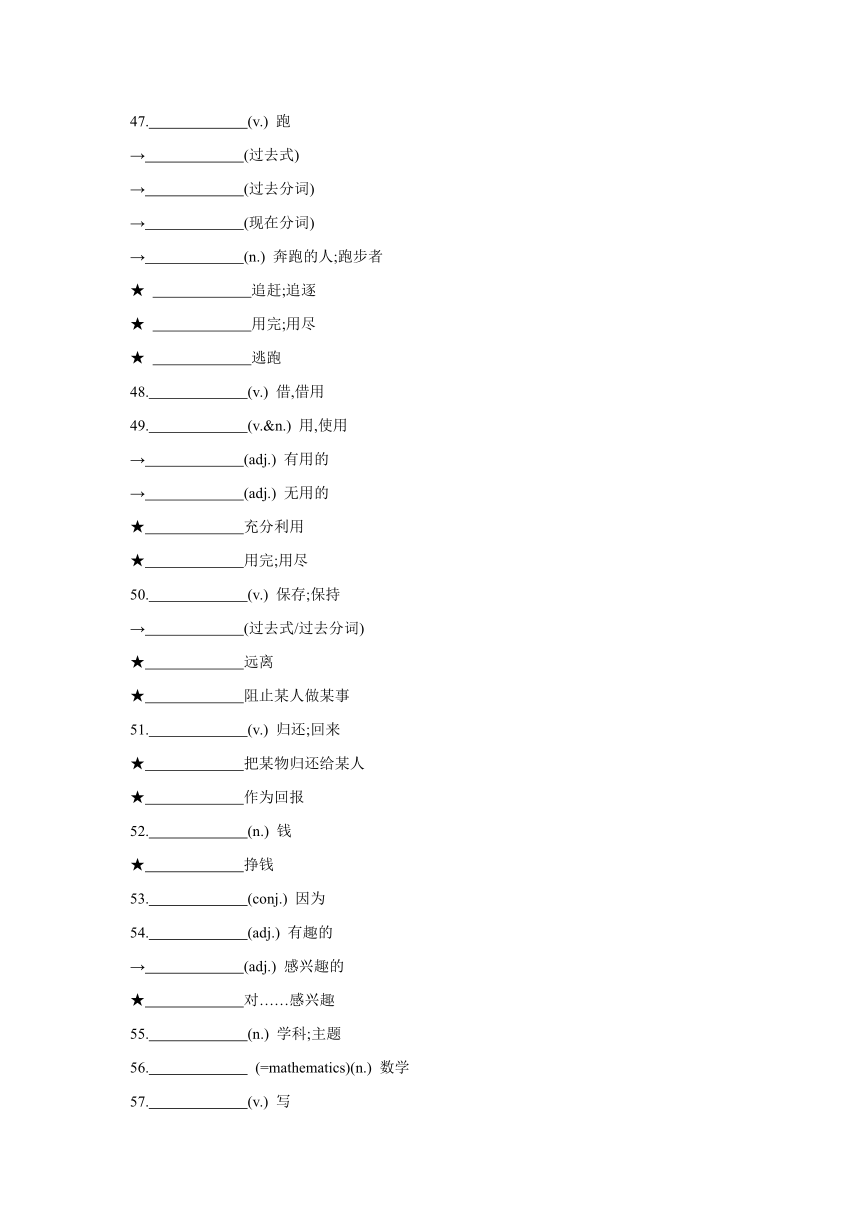
文档简介
课时五 七年级Unit 5
一阶 教材梳理
1. (n.) 大门
★ 校门口
★ 在……的门口
2. (prep.) (表示方式,如乘车等);按照
(adv.) 经过
★ 乘公交车
3. (underground)(n.) 地铁
★ 地铁站
★ 乘地铁
4. (adv.) 总是,一直
5. (n.) 飞机
6. (n.) 火车
(v.) 培训
★ 火车站
★ 乘火车
7. (n.) 工作日
★ 在工作日
8. (adj.) 早的;提早的
(adv.) 早地;提早
→ (比较级) 更早的
→ (最高级) 最早的
9. (n.) 鸟
10. (v.) 捉住;接住;染疾
→ (过去式/过去分词)
★ 感冒
★ 追上,赶上
11. (adv.) 有时
12. (adv.) 很少
13. (v.&n.) 步行;散步
★ 继续前进
★ 散步;随便走走
14. (adv.) 从不
15. (v.) 骑 (自行车、马等)
→ (过去式)
→ (过去分词)
★ 骑自行车
★ 捎某人一程
16. (n.) 公园
(v.) 停(车)
17. (v.) 观看;当心
(n.) 手表
→ (pl.)
★ 当心;小心
18. (n.) 电视
★ 看电视
19. (=film) (n.) 电影
★ 去看电影
20. (v.) 开始
21. (prep.) 在……后
(conj.) 在……以后
22. (n.) 床
★ 在床上
★ 去睡觉
★ 铺床
23. (n.) 篮球
★ 打篮球
★ 篮球运动员
24. (v.&n.) 游泳
→ (过去式)
→ (过去分词)
→ (现在分词)
→ (n.) 游泳者;游泳运动员
25. (v.) (注意地) 听
★ (注意地) 听;倾听
26. (n.) 音乐
→ (adj.) 音乐的;有音乐天赋的
→ (n.) 音乐家
★ 听音乐
27. (n.)图书馆
28. (n.) 星期,周
→ (adj. & adv.) 每周的 (地)
29. (adv.) 一次; 曾经
(conj.) 一旦
★ 再一次
★ 立刻;马上
★ 再次
★ 偶尔
★ 从前
30. (adv.) 两次;两倍
31. (adj.) 伟大的;好极的
32. (n.) 生活;生命
★ 丧生;失去生命
★ 挽救某人的生命
33. (conj.) 或者;否则
34. (adv.) 结束;穿过;多于
(prep.) 在……上面
35. (det.) 更多的
(adv.) 更多
36. (v.&n.)谈话
★ 跟……说
★ 谈论
★ 和……谈话
★ 通过电话交谈
37. (v.) 做,制造;使成为
→ (过去式/过去分词)
★ 编造;弥补
★ 由……制成(看得出原材料)
★ 由……制成(看不出原材料)
38. (n.) 卡片;贺卡
★ 制作卡片
★ 玩纸牌
39. (adj.)没趣的,无聊的
→ (adj.) 无聊的;厌倦的
40. (adv.) 很快,马上
★ 一……就……
41. (n.) 教室
42. (n.) 操场
★ 在操场上
43. (n.) 计算机
44. (n.) 房间;空间
45. (n.) 建筑物,楼房
46. (v.) 使……干净
(adj.) 干净的
→ (反义词) 脏的
★ 打扫某人的房间
★ 打扫
47. (v.) 跑
→ (过去式)
→ (过去分词)
→ (现在分词)
→ (n.) 奔跑的人;跑步者
★ 追赶;追逐
★ 用完;用尽
★ 逃跑
48. (v.) 借,借用
49. (v.&n.) 用,使用
→ (adj.) 有用的
→ (adj.) 无用的
★ 充分利用
★ 用完;用尽
50. (v.) 保存;保持
→ (过去式/过去分词)
★ 远离
★ 阻止某人做某事
51. (v.) 归还;回来
★ 把某物归还给某人
★ 作为回报
52. (n.) 钱
★ 挣钱
53. (conj.) 因为
54. (adj.) 有趣的
→ (adj.) 感兴趣的
★ 对……感兴趣
55. (n.) 学科;主题
56. (=mathematics)(n.) 数学
57. (v.) 写
→ (过去式)
→ (过去分词)
→ (n.) 作家
★ 写下
★ 给某人写信
★ 回信
58. (prep.) 在……中间
★ 在……和……之间
59. (v.) 学习,学会;获悉
→ (过去式/过去分词)
→ (现在分词)
→ (n.) 学习者
★ 了解
★ 学习(如何)做某事
★ 向某人学习某事
60. (n.) 声音
(v.) 听起来好像
61. (n.) 课;课程
62. (adj.) 容易的
→ (比较级) 更容易的
→ (最高级) 最容易的
→ (反义词) 困难的
→ (adv.) 容易地
63. (n.) 活动
→ (pl.)
64. (n.) 科学
→ (n.) 科学家
★ 科学博物馆
重点词块&句式
1.— (新年快乐)!
— (你也一样).
2.— (怎样) do you usually come to school
—I usually come to school (坐地铁).
3.— (多久一次) do you come to the library
— (一周三次).
4. (你现在在做什么)
5.—Excuse me, (我可以借……) some English workbooks
— (当然可以).
6. (我能借它们多久呢)
7. (今天星期几)
8. (什么课) are they having
9. (多少节课) does he have every weekday
10. (什么书) are you reading, Maria
11.— (你认为它怎么样)
—I don't like it. It's (有点难).
12.— (我们能互相帮助吗)
— (好主意)!
13. (哪一学科) do you like best
14.At school, my teachers and classmates (对……非常友好) me.
二阶 语境巧记
1.At the (begin) of the new term, we should make a good study plan.
2.I like (swim) in the pool with my friends in summer. It can make us feel cool.
3.My son wants to be a great (music) when he grows up.
4.There are many (build) in the old city and they were all designed beautifully.
5.The method to learn English is (use), and you can have a try.
6.Yesterday Maria (write) the name and the address on the envelope before sending the letter.
7.The movie is really (wonder), so I want to watch it again.
8.Yuan Longping is a famous (science). He passed away on May 22, 2021.
9.There are few new words in the passage, and you can understand it (easy).
10.When I was young, my mother always told me many (interest) stories.
三阶 语篇串记
learn or many help use they
make activity with how
People are trying to find out whether homework is good 1. bad for students, and they have different opinions.
Some people think that homework is an important part of 2. for students. They believe it not only encourages students to practice what they have learned in class, but also 3. improve their handwriting (书写). They also say that homework helps to teach students 4. to work on their own. What's more, it's a skill which is 5. to them in the future.
However, others don't think so. They think homework makes students stressed out. And the time on homework should be used to do other 6. like reading and playing sports. To back up (支持) 7. opinion, they give the example of Finland (芬兰). In Finland, students have little homework. But the country has been one of the 8. educationally successful countries in the world.
In my opinion, I still believe that homework can really help 9. students' learning. If teachers can 10. students know why they should do homework and let them learn how to do their homework, there is no doubt that students will get more from homework.
【考点讲堂】
频度副词的用法
(2024·河南) Sometimes hurricanes do good.
1.含义:频度副词表示事情发生的频率,频度副词按频率发生的高低依次为:
2.用法:频度副词一般用在be动词、情态动词和助动词之后,实义动词之前。频度副词通常用于一般现在时中,表示现在经常或反复发生的动作或存在的状态。
选词填空。
never usually sometimes
1.—Could you please tell me when people eat mooncakes in China
— on the Mid-Autumn Festival.
2.—Dad, I failed the exam again.
—Cheer up, Tom! challenges can bring out the best in us.
3.—Mr.White, could you give me some advice I have trouble in learning math.
—Sure. You should be confident and give up.
交通方式的常见表达
—Will you go to the museum by bus
—I'd rather take a taxi. It's faster.
按要求完成句子。
1.The engineer gets up early every morning to catch first bus.(盲填)
2.How long does it take from Kunming to Hong Kong train (盲填)
3.Dan often sets off his car to fish with his friends on Sunday afternoons.(盲填)
4.—
—I go to school on foot.(补全对话)
辨析too、also、either和as well
(2024·河南)Hurricanes also pick up heat from the very hot areas of the world and drop it in less warm places.
考点 用法
too 常用于肯定句或疑问句中,一般位于句末,常用逗号与前面的句子隔开
also 常用于肯定句或疑问句中,较正式,一般位于实义动词之前,系动词、助动词、情态动词之后
either 常用于否定句中,放在句末
as well 常用于肯定句中,放在句末,并且其前不用逗号隔开
选词填空。
too either also as well
1.I don't like tigers. My mother doesn't like tigers, .
2.I enjoy listening to pop music, and my friend Lisa enjoys it, .
3.David often helps me with my study. He shares his school things with me.
4.Keep on doing oral exercises in the English Corner. I'm sure you will improve your listening and speaking skills .
辨析listen、hear与sound
(2023·河南)That sounds really interesting!
考点 用法
listen 不及物动词,意为“听”,强调听的动作
listen to 意为“听……”,后跟人或物作宾语
hear 意为“听到;听见”,强调听的结果
hear sb.do sth.意为“听到某人做某事”,强调全过程
hear sb.doing sth.意为“听到某人正在做某事”,强调动作正在进行
sound 连系动词,意为“听起来”,后跟形容词作表语
sound like意为“听起来像”
用方框中所给单词的正确形式填空。
listen hear sound
1.Chinese folk music beautiful. I like it very much.
2.The teacher to his story and then gave him some suggestions to help him.
3.—Excuse me, could you please speak a little more loudly
—Sorry, I thought you could me.
辨析borrow、lend和keep
(2024·河南)And for a trip of this kind, travelers will need a tour guide—someone who can explain to them what they are seeing and help keep them safe.
词汇含义及用法搭配
lend意为“借出”,与borrow相反,指借东西给别人lend sb. sth.=lend sth. to sb.
keep意为“保留,保存(本意);借用(引申)”,是延续性动词,可以和一段时间及 how long 连用keep...for +一段时间
续表
词汇含义及用法搭配
borrow指从别人那里借东西,是非延续性动词,表示“某人把某物借了多久”用sb.have/has kept sth. for+一段时间borrow sth.from sb.
选词填空。
keep borrow lend
1.Sorry, I can't you the dictionary, Betty. I have lost it.
2.You can eggs for about four weeks in your fridge.
3.My car is under repair. Can I yours for a day
【参考答案】
一阶教材梳理
1.gate school gate at the gate of... 2.by by bus 3.subway subway station take the subway 4.always 5.plane 6.train train station take a/the train
7.weekday on weekdays 8.early earlier earliest
9.bird 10.catch caught catch a cold catch up with 11.sometimes 12.seldom 13.walk walk on go for/take a walk 14.never 15.ride rode/rid ridden/rid/rode ride a bike give sb. a ride 16.park 17.watch watches watch out 18.TV watch TV 19.movie go to the movies 20.begin 21.after 22.bed on the bed go to bed make the bed 23.basketball play basketball
basketball player 24.swim swam swum swimming swimmer 25.listen listen to 26.music musical musician listen to music 27.library 28.week weekly
29.once once more at once once again once in a while
once upon a time 30.twice 31.great 32.life lose one's life save one's life 33.or 34.over 35.more 36.talk talk to... talk about talk with... talk on the phone 37.make made make up be made of be made from 38.card make a card/cards play cards 39.boring bored 40.soon as soon as 41.classroom 42.playground on the playground puter 44.room 45.building 46.clean dirty clean one's room do some cleaning 47.run ran run running runner run after run out of run away 48.borrow 49.use useful useless make good use of use up 50.keep kept keep away from keep sb. from doing sth. 51.return return sth. to sb. in return 52.money make money 53.because 54.interesting interested be interested in... 55.subject 56.math 57.write wrote written writer write down write to sb. write back 58.between between...and...
59.learn learned/learnt learning learner learn about
learn (how) to do sth. learn sth. from sb. 60.sound 61.lesson 62.easy easier easiest difficult easily 63.activity activities 64.science scientist science museum
重点词块&句式
1.Happy New Year The same to you 2.How by subway 3.How often Three times a week 4.What are you doing now 5.may I borrow Of course 6.How long can I keep them
7.What day is it today 8.What class 9.How many lessons 10.What book 11.What do you think of it a little difficult 12.Can we help each other Good idea 13.Which subject 14.are very kind to
二阶语境巧记
1.beginning 2.swimming/to swim 3.musician
4.buildings 5.useful 6.wrote 7.wonderful
8.scientist 9.easily 10.interesting
三阶语篇串记
1.or 2.learning 3.helps 4.how 5.useful
6.activities 7.their 8.most 9.with 10.make
考点讲堂
考点1
三悟:1.Usually 2.Sometimes 3.never
考点2
三悟:1.the 2.by 3.in 4.How do you go to school/...
考点3
三悟:1.either 2.too 3.also 4.as well
考点4
三悟:1.sounds 2.listened 3.hear
考点5
三悟:1.lend 2.keep 3.borrow
一阶 教材梳理
1. (n.) 大门
★ 校门口
★ 在……的门口
2. (prep.) (表示方式,如乘车等);按照
(adv.) 经过
★ 乘公交车
3. (underground)(n.) 地铁
★ 地铁站
★ 乘地铁
4. (adv.) 总是,一直
5. (n.) 飞机
6. (n.) 火车
(v.) 培训
★ 火车站
★ 乘火车
7. (n.) 工作日
★ 在工作日
8. (adj.) 早的;提早的
(adv.) 早地;提早
→ (比较级) 更早的
→ (最高级) 最早的
9. (n.) 鸟
10. (v.) 捉住;接住;染疾
→ (过去式/过去分词)
★ 感冒
★ 追上,赶上
11. (adv.) 有时
12. (adv.) 很少
13. (v.&n.) 步行;散步
★ 继续前进
★ 散步;随便走走
14. (adv.) 从不
15. (v.) 骑 (自行车、马等)
→ (过去式)
→ (过去分词)
★ 骑自行车
★ 捎某人一程
16. (n.) 公园
(v.) 停(车)
17. (v.) 观看;当心
(n.) 手表
→ (pl.)
★ 当心;小心
18. (n.) 电视
★ 看电视
19. (=film) (n.) 电影
★ 去看电影
20. (v.) 开始
21. (prep.) 在……后
(conj.) 在……以后
22. (n.) 床
★ 在床上
★ 去睡觉
★ 铺床
23. (n.) 篮球
★ 打篮球
★ 篮球运动员
24. (v.&n.) 游泳
→ (过去式)
→ (过去分词)
→ (现在分词)
→ (n.) 游泳者;游泳运动员
25. (v.) (注意地) 听
★ (注意地) 听;倾听
26. (n.) 音乐
→ (adj.) 音乐的;有音乐天赋的
→ (n.) 音乐家
★ 听音乐
27. (n.)图书馆
28. (n.) 星期,周
→ (adj. & adv.) 每周的 (地)
29. (adv.) 一次; 曾经
(conj.) 一旦
★ 再一次
★ 立刻;马上
★ 再次
★ 偶尔
★ 从前
30. (adv.) 两次;两倍
31. (adj.) 伟大的;好极的
32. (n.) 生活;生命
★ 丧生;失去生命
★ 挽救某人的生命
33. (conj.) 或者;否则
34. (adv.) 结束;穿过;多于
(prep.) 在……上面
35. (det.) 更多的
(adv.) 更多
36. (v.&n.)谈话
★ 跟……说
★ 谈论
★ 和……谈话
★ 通过电话交谈
37. (v.) 做,制造;使成为
→ (过去式/过去分词)
★ 编造;弥补
★ 由……制成(看得出原材料)
★ 由……制成(看不出原材料)
38. (n.) 卡片;贺卡
★ 制作卡片
★ 玩纸牌
39. (adj.)没趣的,无聊的
→ (adj.) 无聊的;厌倦的
40. (adv.) 很快,马上
★ 一……就……
41. (n.) 教室
42. (n.) 操场
★ 在操场上
43. (n.) 计算机
44. (n.) 房间;空间
45. (n.) 建筑物,楼房
46. (v.) 使……干净
(adj.) 干净的
→ (反义词) 脏的
★ 打扫某人的房间
★ 打扫
47. (v.) 跑
→ (过去式)
→ (过去分词)
→ (现在分词)
→ (n.) 奔跑的人;跑步者
★ 追赶;追逐
★ 用完;用尽
★ 逃跑
48. (v.) 借,借用
49. (v.&n.) 用,使用
→ (adj.) 有用的
→ (adj.) 无用的
★ 充分利用
★ 用完;用尽
50. (v.) 保存;保持
→ (过去式/过去分词)
★ 远离
★ 阻止某人做某事
51. (v.) 归还;回来
★ 把某物归还给某人
★ 作为回报
52. (n.) 钱
★ 挣钱
53. (conj.) 因为
54. (adj.) 有趣的
→ (adj.) 感兴趣的
★ 对……感兴趣
55. (n.) 学科;主题
56. (=mathematics)(n.) 数学
57. (v.) 写
→ (过去式)
→ (过去分词)
→ (n.) 作家
★ 写下
★ 给某人写信
★ 回信
58. (prep.) 在……中间
★ 在……和……之间
59. (v.) 学习,学会;获悉
→ (过去式/过去分词)
→ (现在分词)
→ (n.) 学习者
★ 了解
★ 学习(如何)做某事
★ 向某人学习某事
60. (n.) 声音
(v.) 听起来好像
61. (n.) 课;课程
62. (adj.) 容易的
→ (比较级) 更容易的
→ (最高级) 最容易的
→ (反义词) 困难的
→ (adv.) 容易地
63. (n.) 活动
→ (pl.)
64. (n.) 科学
→ (n.) 科学家
★ 科学博物馆
重点词块&句式
1.— (新年快乐)!
— (你也一样).
2.— (怎样) do you usually come to school
—I usually come to school (坐地铁).
3.— (多久一次) do you come to the library
— (一周三次).
4. (你现在在做什么)
5.—Excuse me, (我可以借……) some English workbooks
— (当然可以).
6. (我能借它们多久呢)
7. (今天星期几)
8. (什么课) are they having
9. (多少节课) does he have every weekday
10. (什么书) are you reading, Maria
11.— (你认为它怎么样)
—I don't like it. It's (有点难).
12.— (我们能互相帮助吗)
— (好主意)!
13. (哪一学科) do you like best
14.At school, my teachers and classmates (对……非常友好) me.
二阶 语境巧记
1.At the (begin) of the new term, we should make a good study plan.
2.I like (swim) in the pool with my friends in summer. It can make us feel cool.
3.My son wants to be a great (music) when he grows up.
4.There are many (build) in the old city and they were all designed beautifully.
5.The method to learn English is (use), and you can have a try.
6.Yesterday Maria (write) the name and the address on the envelope before sending the letter.
7.The movie is really (wonder), so I want to watch it again.
8.Yuan Longping is a famous (science). He passed away on May 22, 2021.
9.There are few new words in the passage, and you can understand it (easy).
10.When I was young, my mother always told me many (interest) stories.
三阶 语篇串记
learn or many help use they
make activity with how
People are trying to find out whether homework is good 1. bad for students, and they have different opinions.
Some people think that homework is an important part of 2. for students. They believe it not only encourages students to practice what they have learned in class, but also 3. improve their handwriting (书写). They also say that homework helps to teach students 4. to work on their own. What's more, it's a skill which is 5. to them in the future.
However, others don't think so. They think homework makes students stressed out. And the time on homework should be used to do other 6. like reading and playing sports. To back up (支持) 7. opinion, they give the example of Finland (芬兰). In Finland, students have little homework. But the country has been one of the 8. educationally successful countries in the world.
In my opinion, I still believe that homework can really help 9. students' learning. If teachers can 10. students know why they should do homework and let them learn how to do their homework, there is no doubt that students will get more from homework.
【考点讲堂】
频度副词的用法
(2024·河南) Sometimes hurricanes do good.
1.含义:频度副词表示事情发生的频率,频度副词按频率发生的高低依次为:
2.用法:频度副词一般用在be动词、情态动词和助动词之后,实义动词之前。频度副词通常用于一般现在时中,表示现在经常或反复发生的动作或存在的状态。
选词填空。
never usually sometimes
1.—Could you please tell me when people eat mooncakes in China
— on the Mid-Autumn Festival.
2.—Dad, I failed the exam again.
—Cheer up, Tom! challenges can bring out the best in us.
3.—Mr.White, could you give me some advice I have trouble in learning math.
—Sure. You should be confident and give up.
交通方式的常见表达
—Will you go to the museum by bus
—I'd rather take a taxi. It's faster.
按要求完成句子。
1.The engineer gets up early every morning to catch first bus.(盲填)
2.How long does it take from Kunming to Hong Kong train (盲填)
3.Dan often sets off his car to fish with his friends on Sunday afternoons.(盲填)
4.—
—I go to school on foot.(补全对话)
辨析too、also、either和as well
(2024·河南)Hurricanes also pick up heat from the very hot areas of the world and drop it in less warm places.
考点 用法
too 常用于肯定句或疑问句中,一般位于句末,常用逗号与前面的句子隔开
also 常用于肯定句或疑问句中,较正式,一般位于实义动词之前,系动词、助动词、情态动词之后
either 常用于否定句中,放在句末
as well 常用于肯定句中,放在句末,并且其前不用逗号隔开
选词填空。
too either also as well
1.I don't like tigers. My mother doesn't like tigers, .
2.I enjoy listening to pop music, and my friend Lisa enjoys it, .
3.David often helps me with my study. He shares his school things with me.
4.Keep on doing oral exercises in the English Corner. I'm sure you will improve your listening and speaking skills .
辨析listen、hear与sound
(2023·河南)That sounds really interesting!
考点 用法
listen 不及物动词,意为“听”,强调听的动作
listen to 意为“听……”,后跟人或物作宾语
hear 意为“听到;听见”,强调听的结果
hear sb.do sth.意为“听到某人做某事”,强调全过程
hear sb.doing sth.意为“听到某人正在做某事”,强调动作正在进行
sound 连系动词,意为“听起来”,后跟形容词作表语
sound like意为“听起来像”
用方框中所给单词的正确形式填空。
listen hear sound
1.Chinese folk music beautiful. I like it very much.
2.The teacher to his story and then gave him some suggestions to help him.
3.—Excuse me, could you please speak a little more loudly
—Sorry, I thought you could me.
辨析borrow、lend和keep
(2024·河南)And for a trip of this kind, travelers will need a tour guide—someone who can explain to them what they are seeing and help keep them safe.
词汇含义及用法搭配
lend意为“借出”,与borrow相反,指借东西给别人lend sb. sth.=lend sth. to sb.
keep意为“保留,保存(本意);借用(引申)”,是延续性动词,可以和一段时间及 how long 连用keep...for +一段时间
续表
词汇含义及用法搭配
borrow指从别人那里借东西,是非延续性动词,表示“某人把某物借了多久”用sb.have/has kept sth. for+一段时间borrow sth.from sb.
选词填空。
keep borrow lend
1.Sorry, I can't you the dictionary, Betty. I have lost it.
2.You can eggs for about four weeks in your fridge.
3.My car is under repair. Can I yours for a day
【参考答案】
一阶教材梳理
1.gate school gate at the gate of... 2.by by bus 3.subway subway station take the subway 4.always 5.plane 6.train train station take a/the train
7.weekday on weekdays 8.early earlier earliest
9.bird 10.catch caught catch a cold catch up with 11.sometimes 12.seldom 13.walk walk on go for/take a walk 14.never 15.ride rode/rid ridden/rid/rode ride a bike give sb. a ride 16.park 17.watch watches watch out 18.TV watch TV 19.movie go to the movies 20.begin 21.after 22.bed on the bed go to bed make the bed 23.basketball play basketball
basketball player 24.swim swam swum swimming swimmer 25.listen listen to 26.music musical musician listen to music 27.library 28.week weekly
29.once once more at once once again once in a while
once upon a time 30.twice 31.great 32.life lose one's life save one's life 33.or 34.over 35.more 36.talk talk to... talk about talk with... talk on the phone 37.make made make up be made of be made from 38.card make a card/cards play cards 39.boring bored 40.soon as soon as 41.classroom 42.playground on the playground puter 44.room 45.building 46.clean dirty clean one's room do some cleaning 47.run ran run running runner run after run out of run away 48.borrow 49.use useful useless make good use of use up 50.keep kept keep away from keep sb. from doing sth. 51.return return sth. to sb. in return 52.money make money 53.because 54.interesting interested be interested in... 55.subject 56.math 57.write wrote written writer write down write to sb. write back 58.between between...and...
59.learn learned/learnt learning learner learn about
learn (how) to do sth. learn sth. from sb. 60.sound 61.lesson 62.easy easier easiest difficult easily 63.activity activities 64.science scientist science museum
重点词块&句式
1.Happy New Year The same to you 2.How by subway 3.How often Three times a week 4.What are you doing now 5.may I borrow Of course 6.How long can I keep them
7.What day is it today 8.What class 9.How many lessons 10.What book 11.What do you think of it a little difficult 12.Can we help each other Good idea 13.Which subject 14.are very kind to
二阶语境巧记
1.beginning 2.swimming/to swim 3.musician
4.buildings 5.useful 6.wrote 7.wonderful
8.scientist 9.easily 10.interesting
三阶语篇串记
1.or 2.learning 3.helps 4.how 5.useful
6.activities 7.their 8.most 9.with 10.make
考点讲堂
考点1
三悟:1.Usually 2.Sometimes 3.never
考点2
三悟:1.the 2.by 3.in 4.How do you go to school/...
考点3
三悟:1.either 2.too 3.also 4.as well
考点4
三悟:1.sounds 2.listened 3.hear
考点5
三悟:1.lend 2.keep 3.borrow
